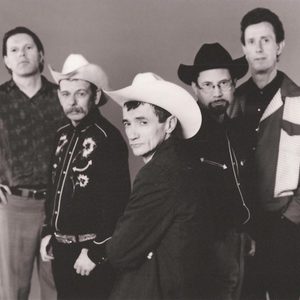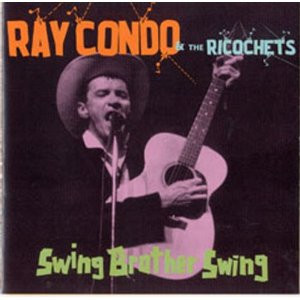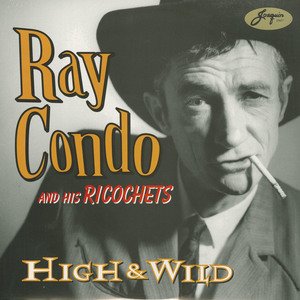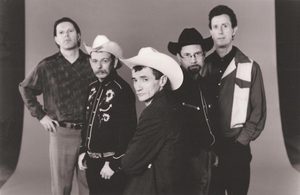Condo, Ray & His Ricochets
Websites:
http://dev.raycondo.ca/
Origin:
Hull, Québec - Ottawa, Ontario - Montréal, Québec - Vancouver, British Columbia, 🇨🇦
Biography:
This obituary by Carl Wilson captures Ray beautifully.
‘He didn’t do anything halfway’
Singer, player and eternal showman, the hard-living journeyman was a keeper of the musical flame
He liked to quote Duke Ellington: “If you’ve lost your heritage, you’ve lost everything.”
If so, the music world lost a little bit of everything last week, with the death of Ray Condo, singer, sax player and keeper of North America’s musical flame.
Mr. Condo led Montreal’s Hardrock Goners beginning in 1983, and the Ricochets in Vancouver from 1994.New bandmate Ian Tiles found Mr. Condo’s body last Thursday, in the Vancouver co-op apartment he occupied alone. The cause of the notorious hard liver’s death was apparently a heart attack, a few weeks short of his 54th birthday. In a sense, this is a death of a salesman, one of those half-glimpsed journeymen of the music business who work the territory overshadowed by chart hits and their towers of PR babble.
Though Mr. Condo released six or seven albums, from 1986’s Crazy Date to 2000’s High & Wild, they never made much money. Instead, almost any night for 20 years, you might have found this rodeo-suited rainmaker on any sawdust stage in the world — sometimes before throngs at a European festival; more often, for beer money and bus fare in some down-at-heel dive.
Yet Mr. Condo was no Willy Loman; he ported no mundane household wares. He was more of a preacher, with a catechism handed down from the Grand Ole Opry and Sun Records — his satchel full of the treasures of American music, from pre-Louis Armstrong to the birth of rock (but not thereafter).
Many retro acts build a single decade or style into shtick, like some tricked-up rootsy ride at Disneyland. By contrast, Mr. Condo ranged through 60 years of hillbilly boogie, jazz, western swing, country, and rhythm and blues, stirring them into new brews in the gallon jugs of his jitterbug personality and sometimes reckless humour.
“He made it present and made it now,” says his long-time guitarist-friend Stephen Nikleva. “It never had a revival quality about it. I must have done 600 shows with him and there was never a boring one. He didn’t do anything halfway.”
Mr. Condo’s repertoire, nearly all covers, ranged from Count Basie and Billie Holiday to Carl Perkins and Arthur Crudup, plus the more obscure likes of Larry Darnell, Glenn Barber and Lew Williams. He was the kind of music devotee influenced not just by “king of western swing” Bob Wills, but by Mr. Wills’ near-forgotten younger brother, Billy Jack Wills, who pushed that postwar country-jazz hybrid within yelping distance of the innovations of bebop and the passion of hard rhythm and blues.
He had a historian’s (and country boy’s) respect for sources. But he also had the irreverence and immediacy of a former punk rocker and eternal showman. I picture his gangly form in mid-concert, in Stetson and skinny tie, leaning into a particularly ripe verse or chorus with a force that made him seem to be looming up in a fish-eye lens. His vitality was ticklishly hypnotic, and just a little dangerous.
As Village Voice critic Robert Christgau wrote of the Ricochets: “They take over . . . so completely that it’s hard to tell whether the songs were this good to begin with, and beside the point to care.”
With such commitment on stage and off, Mr. Condo was equally beloved by rock-critic intellectuals, sentimental American seniors, and kids from England to Japan who dress painstakingly in 1950s pony skirts, pompadours or motorcycle boots to go cut a rug. He once described his audience as from 18 to 68, taking in “goth kids, rednecks, hippies and rockabillies.”
He called his band the Ricochets, he said, because they “bounced around.” And none of them more than their leader.
Mr. Condo was born Ray Tremblay in Hull, Que., in 1950, to an “Ottawa Valley hillbilly” family of eight children. He grew up with the sounds of Hank Williams, Elvis Presley and — closer to home — Ronnie Hawkins. He got his first guitar at 11, and made an album at 16 with a British Invasion-imitation combo called the Peasants.
After high school, he bummed around the country, “doin’ the Kerouac thing.” By the mid-1970s, he’d made his way to Vancouver. Always interested in drawing and painting, he registered for art school at Emily Carr, but after a single term he was absorbed into the city’s new punk scene, becoming bassist in a band called the Secret V’s.
“I was enjoying the spirit of [punk] a lot,” he said later. “It taught me to stand behind what you do and stick up for it. It gave me an almost militant attitude for what I do.”
He left to paint in Montreal for, he thought, a year. But music pulled him in again: He fell in with a gang of artists in the orbit of Og Records, led by comic “sludgeabilly” duo Deja Voodoo. All fans of hillbilly-punk band the Cramps, they helped bring the 34-year-old Mr. Condo back to his Elvis Presley roots. (He had acquired his new surname after couch-surfing around town so much that he got nicknamed a “one-man condo.” He figured it would render any billboard advertising condominiums a free promo for his new band.)
With brothers Peter and Eric Sandmark (later the Crazy Rhythm Daddies) and bassist Clive Jackson (who would also log time in the Ricochets), Mr. Condo named the group after 1940s rock pioneer Hardrock Gunter. They were in the right place, as Og’s It Came from Canada compilations and Deja Voodoo Barbeques were earning the Montreal scene national attention.
Though loose and thrashy compared with what would follow, the Hardrock Goners toured and recorded for 11 years, till Mr. Condo got anxious to return to Vancouver at last. There, he formed the Ricochets by merging with a local group called the Five Star Hillbillies, led by steel guitarist Jimmy Roy.
This band had the mixed fortune to form just when the 1990s “swing revival” had begun. It led to some higher-visibility, heavily booked years, in which the band’s drive and diversity and Mr. Condo’s punk-bred vocals — with their elasticky Don Knotts twang — stood out from the neo-Rat Pack. Still, being even half-trendy means the bubble can half-pop. Having been through that wringer, an exhausted Mr. Condo put the Ricochets on semi-hiatus in 2000.
He took an offer to do maintenance work for Canadian National Railway, which he thought apt, because it was “a blues job,” Mr. Nikleva recalls. For the next three years, the Ricochets played mainly around Vancouver. Though he wished for recognition — and “a raise” — Mr. Condo doesn’t seem to have craved stardom. He often said that an “authentic” music can be ruined when it gets discovered and “taken over.”
Lately, Mr. Condo was planning a new group that would turn from swing toward a more honky-tonk, garage sound, Mr. Nikleva says. Tours were scheduled this summer for Europe and Australia. And sometimes he still spoke of “retiring to the easel,” to the painting life that was always deferred.
But Mr. Condo’s minor heart attack a year ago proved prophetic. Mr. Nikleva says, “Ray was a restless spirit, a person that was always after change,” not only in his music, but personally. He had loyal friends and fans at home and around the world. But he was nomadic, badly underweight, a poor sleeper and an avid smoker and drinker, despite his asthma and weak heart. He never had a stable domestic life. “He burned the candle at both ends, with all that intensity,” Mr. Nikleva says. “He didn’t really take care of himself, didn’t even have a sense of that, and I think he almost needed someone to take care of him. His friends were concerned about him, but Ray was Ray. It’s like trying to tell the king what to do.”
From that perspective, perhaps it is just as remarkable that he lasted this long — twice the “live-fast-die young” life spans of such heroes as Hank Williams. You may credit his sense of his mission: He carried on to be of service to the music he found most genuine, human and necessary. “Most people don’t know anything about roots music and don’t care,” he told one interviewer. “I happen to think that’s a crime. We all have this heritage that we should respect. If we want to get into the future, you’vegot to know where you’re coming from.”
Otherwise, he joked to another, “You get lost, and you end up paying a hundred bucks for a ticket to an Eagles concert.”
-Carl Wilson
Born Ray Tremblay in Hull, Quebec, Ray grew up in nearby Ottawa, Ontario, the third of five children. Ray's two brothers, William (Billy) and Robert were younger; his two sisters, Eileen and Maureen were older. Condo taught himself to play the guitar at 11 and by the time he was 16 he had co-written and released his first recording, 'If You Only Knew' with a band in the style of the British invasion called The Peasants.
Ray attended an elite vocational fine art & design high school specifically established by the Ontario Ministry of Education for those showing exceptional talent in fine art and design. An intense and rigorous 4-year program, many who started never completed the course but Ray seemed to thrive in this environment. It was during this time that his sister Eileen passed on. This shook Ray to the core but he continued on, graduating and finding himself on the road, heading west and away from Ottawa. Reaching Vancouver, Ray studied at the Emily Carr Institute of Art and Design. Not feeling all that challenged by their curriculum, after one year he dropped out and found himself drawn to a world he would eventually return to for good ... music! That started with him playing bass in a Vancouver punk rock group called The Secret Vs.
He left for Montreal to paint for a year, but once again got caught up in music, getting together with bassist Clive Jackson, banjoist Chris Dean, violinist Edgar Bridwell, guitarist Eric Sandmark, and drummer Peter Sandmark to form a band called Ray Condo and his Hardrock Goners, named for Hardrock Gunter, an early rock and roll musician. The Hardrock Goners performed a variety of styles, such as rockabilly, jazz, blues, country and western swing. Their first recordings appeared on the Og label's compilations, "It Came From Canada". They then established their own record label, "Crazy Rekkids".
He earned the last name "Condo" from friend Regan O'Connor, who also came up with the name of the band, Ray Condo and his Hardrock Goners.
In 1991, he returned to Vancouver. The Hardrock Goners toured with him for another three years, and then he and his bassist merged in with a group called The Five Star Hillbillies, to create a new group called The Ricochets, named after how much they "bounced around". They made their last album in 2000.
In 2003, Condo suffered from a minor heart attack. A year later, new band member Ian Tiles found Condo dead from a heart attack in his Vancouver apartment.
Ray Condo and His Ricochets didn’t always play the songs that they looked like they should have been playing. Dressed like country music stars from the 1950s, they played plenty of western swing and rockabilly tunes, but mixed in jazz and blues, as well. Performing few compositions of their own, their repertoire consisted of well-known and obscure songs covering a wide range of popular American music styles from the first sixty years of the twentieth century. Describing his band to Joel Bernstein of Country Standard Time, Condo referred to legendary figures from country-western, jazz, and western swing, saying they sound like “Hank Williams having a drink with Billie Holiday, and Bob Wills is the bartender.”
While remaining faithful to the spirit of the old songs they played, Condo and His Ricochets put their signature sound on each tune. Discussing the band’s approach to the music, Condo told Rich Kienzle of Country Music, “We’ve never been purists. We’re not afraid of mixing things in. But I think the archival approach to our music is really important.” Steel guitar player Jimmy Roy and guitarist Steven Nikleva arranged the songs for the band, and Roy’s instrument makes a unique contribution to the band’s sound. Although the non-pedal steel guitar is a staple of country music, it’s a stranger in a strange land in the jazz and blues songs Ray Condo and His Ricochets play. Even on the western swing pieces, Roy’s steel guitar takes on a different role than usual, playing the part that has traditionally belonged to the fiddle. Condo told Dave Howell of the Allentown, Pennsylvania Morning Call what makes the steel guitar important to the Ricochets’sound:’The steel guitar was the first synthesizer. Although it’s used a lot in country, it really hasn’t been fully exploited.”
Ray Condo and His Ricochets were formed in Vancouver, British Columbia, where Condo, the band’s lead singer and saxophonist, first met Roy in the 1980s. The two didn’t join forces until much later, though. Condo, born near Montreal and raised in Ottawa, began his musical career as a rock guitarist in the 1960s. He went on to play punk rock for a time, before turning his hand to rockabilly. In 1984, he joined forces with stand-up rockabilly bassist Clive Jackson to form Ray Condo and His Hardrock Goners, who put out three albums and toured extensively throughout Canada and Europe.
Meanwhile, Roy met guitarist Nikleva in Vancouver, where he was in a western swing band. In 1990 the two of them, along with drummer Steve Taylor, helped form a honky-tonk revival band called Jimmy Roy’s Five Star Hillbillies. When Condo’s and Roy’s bands came to an end in 1995 they gottogetherwith Jackson, Nikleva, and Taylor, to form Ray Condo and His Ricochets. The band wasted no time, releasing their fist album later that year. When Swing, Brother, Swing came out on the small Vancouver label East Side, it caught the attention of Jeff Richardson, owner of Joaquin Records in San Francisco. For years Richardson had been reissuing old western swing recordings, but had never thought of releasing a current artist’s material before hearing Condo and His Ricochets. After licensing the album from East Side, Richardson decided the album need some changes. Condo told Bernstein, “Jeff thought it was a little too mellow. We added half a dozen tunes (while removing others) to make it more upbeat.”
When the new version of Swing, Brother, Swing came out in 1996, it attracted critical attention forthe band’s innovative take on a wide variety of old material. The album includes tunes by Count Basie, Carl Perkins, and Stuff Smith. In a review in the Village Voice, Robert Christgau wrote, “They take over the material so completely that it’s hard to tell whether the songs were this good to begin with, and beside the point to care.” Condo and His Ricochets followed up quickly with their the release of Door to Door Maniac in 1997, and once again the band attracted attention and praise for their diversity of material. John Wooley wrote in the Tulsa World, “Condo and the boys cast their net wide and haul in plenty of gems.” While their sound remained the same, their second album brought a personnel change, with John Cody playing drums on some tracks before officially replacing Taylor in the band in February of 1997.
Members include John Cody (joined group, 1997), drums; Ray Condo (born Ray Trombley, 1950, Hull, Quebec, Canada), vocals and saxophone; Clive Jackson , bass; Steven Nikieva , guitar; Jimmy Roy , steel guitar; Steve Taylor (left group, 1997), drums.
Grouped formed in Vancouver, Canada, 1995; released debut album Sluing, Brother, Swing on East Side, 1995; signed with Joaquin Records and released revised version of Swing, Brother, Swing, 1996; released Door to Door Maniac, 1997.
Addresses: Record Company —Joaquin Records, 254 Scott St., San Francisco, CA 94117.
Along with critical praise, Condo and His Ricochets’ albums have done well on the Americana charts, which measures sales and airplay of alternative country music. Still, sales have been modest when compared to more mainstream country bands. The band prefers staying outside of the Nashville country music industry, though, so that they can keep their own sound. Roytold Kienzle, “When you hear a country band, they’re actually a rock band.” Condo added his own thoughts about what would happen to the band if they went to a major label: “They’d have a new marketing term for us. They’d call it ’Hick Hop’.”



